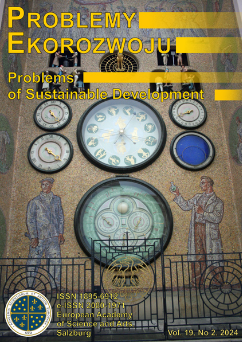Europe 2020 Strategy and European Recovery
Erich Hoedl
European Academy of Science and Arts, Fleischmarkt 22/63, A-1010 Vienna (Austria)
Abstract
European Recovery and a turn into a “new economy” in Europe are hampered by the Washington Consensus and the large disparities between the Member States. Europe 2020 Strategy neglects both dimensions and continuous to apply the basic principles of economic policy of the Lisbon Strategy. Emerging global multi-polarity need a loosening from the dollar-dominated financial markets and a priority for strengthening the real economy in Europe. Instead of financial help packages the public financial expenditures should be addressed to the seven flagship initiatives of the Europe 2020 Strategy, which can level-off existing economic disparities. For this, the Currency Union needs to be complemented by a fiscal policy going far beyond the stronger economic governance proposed by Europe 2020. Europe has to raise a financial transaction tax and to allocate it by a system of fiscal federalism partly to economically weaker Member States. Installing legally more elements of a “transfer union” would strengthen European competitiveness.
Keywords:
Europe 2020, fiscal policy, financial transaction tax, transfer union, inclusive growthReferences
CECCHINI P., 1988), The economics of 1992, in: European Economy, no. 35.
Google Scholar
CUPERUS R., DUFFEK K.A., FRÖSCHL E., MÖRSCHEL T. (eds.), The EU – A Global Player ?, Wien-Berlin 2006.
Google Scholar
EUROPÄISCHE GEMEINCHAFTEN, Die Herausforderungen annehmen, Luxemburg 2004.
Google Scholar
EUROPEAN COMMISION, Europe 2020. A strategy for smart, sustainable and inclusive growth, COM (2010) 2020, Brussels 3.3.2010.
Google Scholar
EUROPEAN COMMISION, A European Union strategy for sustainable development, Luxemburg 2002.
Google Scholar
EUROPEAN COMMISION, European Competitiveness Report 2003, SEC (2003) 1299, Brussels 12.11.2003.
Google Scholar
EUROPEAN COUNCIL, Conclusions, Brussels 26 March 2010.
Google Scholar
HÖDL E., Socio-ecological market economy in Europe. Interrelation between resource, labour and capital productivity, in: Sustainable Growth and Resource Productivity, eds. Bleischwitz, R., Welfens, P.J.J., Zhang, Z., Sheffield 2009, p. 147-156.
Google Scholar
HÖDL E, 2007, Die Europäische Union als Wissensgesellschaft, in: Wirtschaft und Gesellschaft, Heft 4, p. 529-551.
Google Scholar
HOEDL E., Weltwährung Euro?, in: Europa von innen und außen, eds. Held K., Knipping F., Trier 2001, p. 139-156
Google Scholar
HÖDL E., WEIDA A., Europäische Wirtschaftsordnung, Frankfurt/Main 2001.
Google Scholar
KALFF D., Europas Wirtschaft wird gewinnen, Frankfurt/Main 2005.
Google Scholar
KEYNES J.M., 1931, Gedanken über den Frei-handel, in: Wirtschaftsdienst, 16. Jahrgang, p. 749-752.
Google Scholar
KEYNES J.M., 1933, Nationale Selbstgenüg-samkeit, in: Schmollers Jahrbuch, 57. Jahrgang, p. 561-570.
Google Scholar
KEYNES J.M., 1988, Vorschläge für die Gründung einer internationalen Clearing Union, in: Lettre International, nr. 40, Herbst.
Google Scholar
KNIPPING F., Rom, 25. März 1957, Die Einigung Europas, München 1988.
Google Scholar
KREMLICKA R., Wohlstand sucht Wachstum, Wien 2005.
Google Scholar
LARSSON A., Towards A „Smart Growth Strategy“ For The EU, in: The EU – A Global Player? Ed. Cuperus R. Et al., 2006, p. 55-61.
Google Scholar
MARTERBAUER M., Wem gehört der Wohlstand?, Wien 2007.
Google Scholar
PROJECT EUROPE 2030. Challenges and Opportunities, May 2010.
Google Scholar
ROEDER O., BLEISCHWITZ R., 2006, Materialeffizienz als Wettbewerbsstrategie, in: Umweltwitrschafts-forum,14.Jg, Heft 4, p. 6-12.
Google Scholar
RODRIGUES M.J., The debate about Europe and The Lisbon Strategy, in: The EU-A Global Player?, ed. Cuperus, R. et.al., 2006, p. 63-76
Google Scholar
ROUBINI N., MIHM S., Das Ende der Weltwirtschaft und ihre Zukunft. Crises Economics, Frankfurt/Main 2010.
Google Scholar
ROTSCHILD K. W., 2005,, New Worlds – New Approaches. A Note on Future Research Strategies, in: Kyklos, vol. 58, p. 439-447.
Google Scholar
SCHULMEISTER S., Mitten in der großen Krise. Ein „New Deal“ für Europa, Wien 2010.
Google Scholar
SCHRATZENSTALLER M. Unternehmensbesteuerung in der Europäischen Union zwischen Wettbewerb und Harmonisierung, in: Aspekte einer europäischen Wirtschaftsordnung, ed. Hödl, E., Marburg 2007, p.77-97
Google Scholar
SKIDELSKI R., Die Rückkehr des Meisters. Keynes für das 21. Jahrhundert, München 2010.
Google Scholar
SINN H.-W., Kasino Kapitalismus, München 2010.
Google Scholar
SINN H.-W., Ist Deutschland noch zu retten?, München 2004.
Google Scholar
STADLER W., Tobin-Tax light, in: Aspekte einer europäischen Wirtschaftsordnung, ed. Hödl, E., Marburg 2006, p. 139-155.
Google Scholar
TICHY, G. Warum braucht Europa eine eigene Wirtschaftsverfassung ?, in: Europäische Wirtschafts und Gesellschaftsordnung, ed. Hödl, E., Marburg 2005, p. 55-75.
Google Scholar
TICHY G., 2009, Einige unkonventionelle Gedanken zum Leben nach der Krise, in: Wirtschaft und Gesellschaft, Heft 4, p.501-513.
Google Scholar
Authors
Erich HoedlEuropean Academy of Science and Arts, Fleischmarkt 22/63, A-1010 Vienna Austria
Statistics
Abstract views: 11PDF downloads: 6
License

This work is licensed under a Creative Commons Attribution-ShareAlike 4.0 International License.




